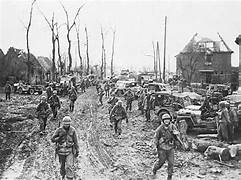The 16th of November 1944 marked a crucial turning point in World War II with the commencement of the Rhineland Offensive, a major military operation conducted by the Allied forces. This offensive, also known as the Battle of the Bulge, was a significant campaign on the Western Front, ultimately shaping the course of the war in favor of the Allies.
The Rhineland Offensive was part of a broader strategy by the Allies to push back German forces and regain control of vital territories. As the Allies had successfully landed in Normandy on D-Day in June 1944 and made substantial progress through France, the time had come to cross the formidable natural barrier of the Rhine River, a key geographical obstacle that separated the Allies from Germany.
Led by General Dwight D. Eisenhower, the Supreme Commander of the Allied Expeditionary Force, and General Omar Bradley, the Commander of the U.S. 12th Army Group, the offensive involved a massive deployment of troops, including American, British, and Canadian forces. The initial objective was to secure the bridgeheads over the Rhine and pave the way for a full-scale invasion into Germany.
The German High Command, aware of the strategic importance of the Rhineland, had fortified the region with a series of defensive lines known as the "Siegfried Line" or the Westwall. The Allies faced stiff resistance as they encountered well-entrenched German forces determined to halt their advance. The harsh winter weather added an additional layer of complexity, making the terrain difficult to navigate and the battle even more grueling.
However, the Allies, displaying resilience and determination, managed to break through the German defenses. The battle was marked by intense and brutal fighting, with both sides suffering heavy casualties. The Allies utilized a combination of infantry, armored divisions, and air support to overcome the German resistance. The success of the Rhineland Offensive was instrumental in weakening German forces and disrupting their defensive capabilities.
By the end of November 1944, the Allies had secured significant bridgeheads over the Rhine, opening up the possibility of a direct assault into the heart of Germany. The success of this offensive laid the groundwork for subsequent operations that ultimately led to the collapse of Nazi Germany. The Battle of the Bulge, as it became known, proved to be a decisive moment in the war, showcasing the effectiveness of coordinated Allied efforts and their ability to adapt to challenging circumstances.
The Rhineland Offensive not only had strategic implications but also had a profound psychological impact on both the Allied and German forces. For the Allies, it was a symbol of their determination to push forward despite adversity, while for the Germans, it marked a significant setback and a foreshadowing of the eventual defeat that awaited them.




